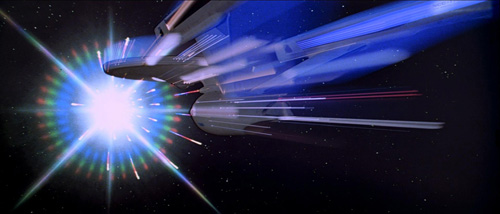Difference between revisions of "warp drive (FASA)"
m |
|||
| (3 intermediate revisions by the same user not shown) | |||
| Line 1: | Line 1: | ||
| − | {{ | + | {{MyriadWarpDrive}} |
{{ImageInfoBox2|name=warp drive|file=warp_drive-st01.jpg|caption=Warp drive ([[Star Trek: The Motion Picture (Film)|ST01]])}} | {{ImageInfoBox2|name=warp drive|file=warp_drive-st01.jpg|caption=Warp drive ([[Star Trek: The Motion Picture (Film)|ST01]])}} | ||
{{TableRow|title=Advertising|data={{AmazonLink2}} }} | {{TableRow|title=Advertising|data={{AmazonLink2}} }} | ||
|}</div> | |}</div> | ||
| − | An engine capable of faster-than-[[speed of light|light]] speeds, warp drive was invented by a [[Centaurans (FASA)|Centauran]] scientist named [[Cochrane, Zefram (FASA)|Zefram Cochrane]] | + | {{BannerFASA}} |
| + | An engine capable of faster-than-[[speed of light|light]] speeds,<ref name="TOS00"/> warp drive was invented by a [[Centaurans (FASA)|Centauran]] scientist named [[Cochrane, Zefram (FASA)|Zefram Cochrane]].<ref name="TOS31"/> Without warp drive, destinations that were otherwise [[days]] away were, instead, [[years]] distant.<ref name="TOS01"/> | ||
Warp drive "consists of the generation of a field about a spacecraft which bends or warps space in the direction of travel. ... Since space is being moved relative to itself ... no neighboring regions exceed the speed of light. However, the total effect on the ship ... is multi-light velocities [which] ... avoids the speed constraints imposed by the theory of relativity."<ref name="Maps"/> | Warp drive "consists of the generation of a field about a spacecraft which bends or warps space in the direction of travel. ... Since space is being moved relative to itself ... no neighboring regions exceed the speed of light. However, the total effect on the ship ... is multi-light velocities [which] ... avoids the speed constraints imposed by the theory of relativity."<ref name="Maps"/> | ||
| − | The so-called "time barrier," or warp factor four, was broken<ref name="TOS00"/> in [[2243 (FASA)|2243]] due to improvements in matter/[[antimatter]] engine design. This made much more energy available, allowing for more powerful warp field generators to be used.<ref name="Maps"/> | + | The so-called "time barrier," or warp factor four,<ref name="Maps"/> was broken<ref name="TOS00"/><!-- in [[2243 (FASA)|2243]] --> due to improvements in matter/[[antimatter]] engine design. This made much more energy available, allowing for more powerful warp field generators to be used.<ref name="Maps"/> |
{{References}} | {{References}} | ||
<references> | <references> | ||
| − | <ref name="TOS00">{{ | + | <ref name="TOS00">{{RefTOS01}}</ref> |
| − | <ref name="TOS01">{{ | + | <ref name="TOS01">{{RefTOS02}}</ref> |
| + | <ref name="TOS31">{{RefTOS31}}</ref> | ||
<ref name="Maps">{{RefMaps}}</ref> | <ref name="Maps">{{RefMaps}}</ref> | ||
</references> | </references> | ||
Latest revision as of 08:24, 26 April 2023
An engine capable of faster-than-light speeds,[1] warp drive was invented by a Centauran scientist named Zefram Cochrane.[2] Without warp drive, destinations that were otherwise days away were, instead, years distant.[3]
Warp drive "consists of the generation of a field about a spacecraft which bends or warps space in the direction of travel. ... Since space is being moved relative to itself ... no neighboring regions exceed the speed of light. However, the total effect on the ship ... is multi-light velocities [which] ... avoids the speed constraints imposed by the theory of relativity."[4]
The so-called "time barrier," or warp factor four,[4] was broken[1] due to improvements in matter/antimatter engine design. This made much more energy available, allowing for more powerful warp field generators to be used.[4]
Notes and References
- ↑ 1.0 1.1 Roddenberry, Gene (Executive Producer). "The Cage". Star Trek, season 0, episode 0 (Production number 01). Directed by Robert Butler. Written by Gene Roddenberry. Released 1986. Desilu Productions. 1965.
- ↑ Roddenberry, Gene (Executive Producer). "Metamorphosis." Star Trek, Season 2, Episode 2. Directed by Ralph Senensky. Written by Gene L. Coon. Desilu Productions, 10 November 1967.
- ↑ Roddenberry, Gene (Executive Producer). "Where No Man Has Gone Before". Star Trek, season 1, episode 3 (Production number 02). Directed by James Goldstone. Written by Samuel A. Peeples. Desilu Productions. 22 September 1966.
- ↑ 4.0 4.1 4.2 Maynard, Jeff (Author). Star Trek Maps. Star Trek. Book. Bantam Books. August 1980.

